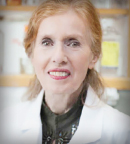The National Inventors Hall of Fame (NIHF) recognizes the enduring legacies of exceptional U.S. patent holders on an annual basis. On October 26, 2023, three female inductees will be recognized for their extraordinary contributions to cancer care and clinical research.

Jennifer Doudna, PhD

Emmanuelle Charpentier, PhD

Angela Hartley Brodie, PhD
Biochemist Jennifer Doudna, PhD, and microbiologist Emmanuelle Charpentier, PhD, co-invented the gene-editing system CRISPR-Cas9, a technology for editing DNA with unprecedented precision and efficiency, which is being tested for treatment of genetic diseases, including sickle cell disease and other disorders caused by a mutation in a single gene. Angela Hartley Brodie, PhD, inducted into NIHF posthumously, discovered and developed aromatase inhibitors, which are among the leading therapies against breast cancer. NIHF applauds the inventions of these remarkable women. They were among the 10 living inductees and 6 historical inductees named to this year’s NIHF Hall of Fame.
More About Dr. Doudna and Dr. Charpentier
Drs. Doudna and Charpentier began collaborating in 2011. Until then, they had been researching different aspects of RNA and CRISPR independently—Dr. Doudna at the University of California, Berkeley (UC Berkeley), and Dr. Charpentier at Umeå University in Sweden. Their partnership led to the 2012 discovery that Cas (CRISPR-associated) 9, a gene-cutting protein used by bacteria to kill viruses, can be re-engineered as a programmable gene-editing tool.
Dr. Doudna and Dr. Charpentier described how an RNA molecule guides the CRISPR-Cas9 system, binding it to a specific region in the DNA, and showed how the Cas9 protein then cuts the DNA, allowing it to be edited in a precise manner. The CRISPR-Cas9 system is reportedly quicker, more accurate, and more efficient than previous genome-editing methods. Laboratories worldwide have incorporated CRISPR-Cas9 into their research programs.
The Nobel Prize in Chemistry was awarded to Dr. Doudna and Dr. Charpentier in 2020. They also have been named the winners of the Harvey Prize and the Wolf Prize in Medicine among their many additional honors.
Dr. Doudna has been with UC Berkeley since 2002, and she currently holds the Li Ka Shing Chancellor’s Chair in Biomedical and Health Sciences. She is also Professor in the Departments of Chemistry and of Molecular and Cell Biology. She founded the Innovative Genomics Institute in 2014. To commercialize her CRISPR technologies, Dr. Doudna has founded several companies including Caribou Biosciences, Intellia Therapeutics, Mammoth Biosciences, and Scribe Therapeutics. She holds more than 100 U.S. patents.
In 2015, Dr. Charpentier joined the Max Planck Society; since 2018, she is Director of the Max Planck Unit for the Science of Pathogens. She is also the co-founder of CRISPR Therapeutics and ERS Genomics together with Rodger Novak and Shaun Foy.
More About Dr. Brodie
Dr. Brodie was born in Oldham, Lancashire, England. She attended Ackworth School. Dr. Brodie’s father was an organic chemist, and he supported her broad-ranging interest in science. In fact, he urged her to pursue a career in science at a time when women were not typically encouraged to enter such fields.
She earned her bachelor’s and master’s degrees in biochemistry from the University of Sheffield in 1956 and 1959, and her doctorate in chemical pathology from the University of Manchester in 1961. Dr. Brodie died on June 7, 2017, at age 82.
In 1962, Dr. Brodie moved to the United States and joined the steroid biochemistry training program sponsored by the National Institutes of Health at the Worcester Foundation for Experimental Biology. There, she met her future husband, Harry Brodie, PhD. Each researched the biochemistry of aromatase for different purposes. Dr. Harry Brodie was interested in its application to contraception, whereas Dr. Angela Brodie was determined to identify a link between estrogen biosynthesis and the needs of patients with breast cancer.
The Brodies spent the 1970s optimizing the first selective aromatase inhibitors, developing methods of administration, and testing synthetic compounds to block estrogen synthesis. One compound, 4-hydroxyandrostenedione (4-OHA), proved to be particularly effective.
In 1979, Dr. Angela Brodie moved to the University of Maryland School of Medicine in Baltimore and began manufacturing clinical-grade material in her own laboratory. She was Professor of Pharmacology at the School of Medicine and a researcher in the Hormone Responsive Cancers Program at the University of Maryland Marlene and Stewart Greenebaum Comprehensive Cancer Center. Promising results from the first clinical trial in 1981 spurred further testing of 4-OHA. Subsequent studies showed that 4-OHA reduced blood estrogen levels.
2023 Living Inductees
Emmanuelle Charpentier, PhD
CRISPR-Cas9 Gene Editing
U.S. Patent No. 10,266,850
Inducted in 2023
Born: Dec. 11, 1968
Jennifer Doudna, PhD
CRISPR-Cas9 Gene Editing
U.S. Patent No. 10,266,850
Inducted in 2023
Born: Feb. 19, 1964
2023 HistoricalInductee
Angela Hartley Brodie, PhD
Aromatase Inhibitors
U.S. Patent No. 4,235,893
Inducted in 2023
Born: Sept. 28, 1934
Died: June 7, 2017
In 1993, pharmaceutical company Ciba-Geigy brought 4-OHA, known as formestane, to market to treat advanced breast cancer in postmenopausal women. It was the first new agent in a decade explicitly developed to treat breast cancer. Currently, three aromatase inhibitors are approved: anastrozole, letrozole, and exemestane.
Named on 13 U.S. patents, Dr. Angela Brodie was a Fellow of the American Academy for Cancer Research (AACR). Her distinguished career at the University of Maryland School of Medicine spanned 37 years until her retirement in 2016. In 2005, Dr. Angela Brodie became the first woman to be honored with the Charles F. Kettering Prize from the General Motors Cancer Research Foundation.
About the National Inventors Hall of Fame
The National Inventors Hall of Fame was founded in 1973 in partnership with the U.S. Patent and Trademark Office. The group has honored, inspired, and challenged more than 3 million children, educators, and inventors across the country. Every year beginning in 1973, NIHF has recognized individuals who have conceived, patented, and advanced the world’s greatest technologic achievements. Visit https://www.invent.org/inductees to learn more and to see the full list of inductees.
Adapted by permission from the National Inventors Hall of Fame.

